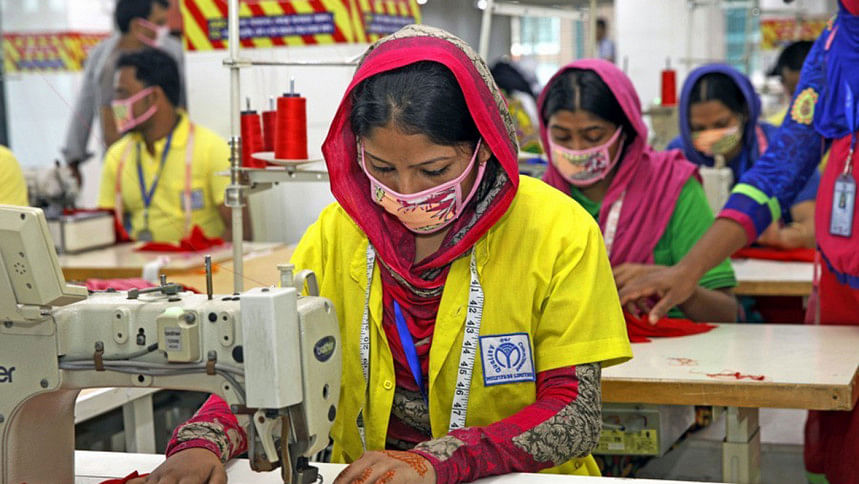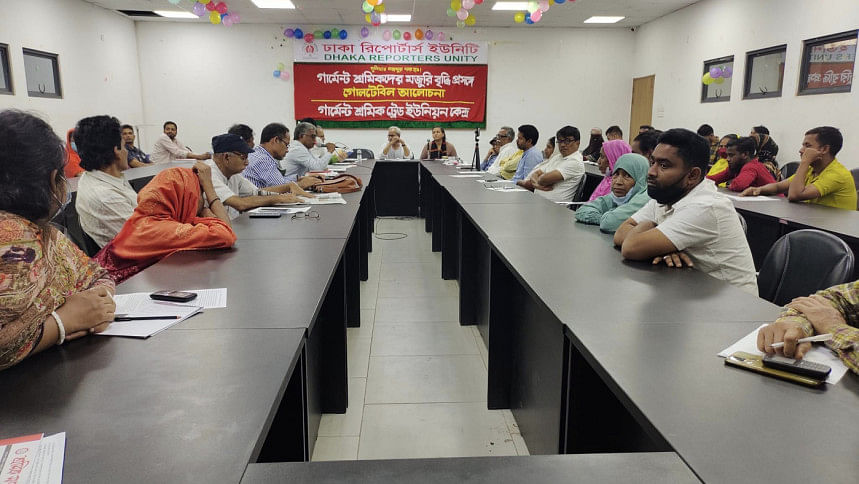‘How can RMG workers survive on Tk 8,000?’

Considering the cost of living, the government has to form a wage board immediately for garment workers and ensure a minimum wage of Tk 25,000, noted economists and rights leaders said today.
The demand was made at a roundtable discussion organised by the Garment Workers Trade Union Centre held at the Nasrul Hamid auditorium in the Dhaka Reporters' Unity office.
While addressing the programme, renowned economist Prof Anu Muhammad criticised the government's use of the term "adjustment", which he claims was imported from the World Bank and the International Monetary Fund (IMF).
"They increased the prices of utilities to cover up their acute corruption," said Anu Muhammad pointing out that despite the increased cost of daily commodities, the salary of RMG workers remained unchanged.
"How can they survive on Tk 8,000? Can a four-member family survive with this amount? What about their education, treatment, and other living expenses?" questioned the retired professor of the economics department at Jahangirnagar University.
Comparing the wages of RMG workers in Bangladesh to other less developed countries, Anu Muhammad said that Bangladeshi RMG workers receive the lowest wages.

"Cambodia's economy is smaller than ours. But their RMG workers get higher salaries than us," he added.
He also stressed the importance of arranging food rationing facilities for RMG workers who are in need of such support.
He expressed concern that the police and other law enforcement agencies, who are suppressing logical movements, are receiving food rationing facilities while those who require it the most are being denied.
Mahbubur Rahman Ismail, president of the Bangladesh Textile Garments Workers Federation, held officials from the Ministry of Labour responsible for not forming a wage board for RMG workers.
Ismail alleged that the officials are only interested in looting public money.
He demanded the formation of a wage board within a week and called for all workers to unite and press home their demands.
Poet and journalist Sohrab Hassan criticised the government for exploiting farmers and RMG workers, who he believes are the lifeblood of the country.
He argued that the workers should be benefitting from the flourishing industry in the country, but that is not the case.
Sohrab advocated for a wage board for RMG workers and demanded to blacklist factories that do not follow the salary structure set by the board.
Other speakers at the event included Mujahidul Islam Selim, former president of the Communist Party of Bangladesh; Towhidur Rahman, chairman of Bangladesh Garments Sramik Oikya Parishad; advocate Mantu Ghosh, president of the Garment Workers Trade Union Centre; General Secretary Sadekur Rahman Shamim; and Vice President Joly Talukder.

 For all latest news, follow The Daily Star's Google News channel.
For all latest news, follow The Daily Star's Google News channel. 



Comments